This is the last interview that Hieromonk Vasily (Roslyakov) is known to have given, shortly before Pascha, April 18, 1993, when he and two other monks—Trophim and Therapont—were killed by the hand of a satanist at Optina Pustyn.
—Fr. Vasily, what do you think—will Optina be reborn?
—Holy Scripture tells us that God is not the God of the dead, but of the living. In God, all are alive. We serve precisely this God, Who arose and conquered death by His resurrection; God has no death, and in God there is no death; it exists only outside of God. Therefore, it is wholly natural that Optina is alive. For a believer, this question does not even exist.
—And are there living elders?
—Of course.
—And the spirit of Russia—what is it?
—The spirit of Russia is Christ. He tells us, I am the Way, the Truth, and the Life. Inasmuch as spirituality cannot be outside of Christ, for Russia it is expressed in one word: Christ. He is everything.
—Maybe this is where our tragedy comes from
—Without a doubt.
—We are devoted to Christ, and therefore we are persecuted?
—That is undoubtedly so, as Christ said, In the world ye shall have tribulation: but be of good cheer; I have overcome the world (Jn. 16:33). The promises of the Lord are immutable, and no one can ever abolish them. We live today only by these promises. It’s the only way.
—I realize that it’s probably impossible to ask, but anyways, tell us, as far as possible, about your internal life.
—The internal life of Optina is a mystery, a Sacrament. Our Church has seven Sacraments, as you know. Everything is anchored on these Sacraments, and every Sacrament has some external coloring—some prayers are read, some actions are completed—but during the Sacraments it’s Christ Himself Who acts, invisibly. It is His grace that completes the Sacrament. It’s the same with the external and internal life of Optina. You see the external, but the internal life is impossible to speak about. Again: The internal life of Optina Pustyn is Christ Himself. We can understand this internal life only if we join ourselves to God. It can be opened to you no other way. I am the door, says the Lord, by me if any man enter in, he shall be saved, and shall go in and out, and find pasture (Jn. 10:9). The door to the inner spiritual life of Optina is Christ.
—And all of this is unspoken?
—Unspoken, because how can you speak about how God acts? It’s impossible.
—But can you speak about how you feel, for example?
—It’s possible. Take the Psalms of David. He says, O taste and see that the Lord is good. Please—eat and see. For whom the Lord loveth he chasteneth, and scourgeth every son whom he receiveth (Heb. 12:6). We are God’s beloved sons because we possess the truth of Orthodoxy, and therefore, naturally, we are chastened, for the Lord especially loves us. As any father, who loves his son, he does not leave him without chastisement. He chastises out of love, not out of cruelty. Do you understand? We’re used to chastising only out of cruelty. We don’t know such a feeling—love, and we don’t know what chastisement with a feeling of love is. The Lord chastises us precisely with love, to teach us. We are sent some sorrows for this purpose, for our admonishment, that we would know the truth of Christ. Therefore, there is nothing frightful in this; we must be ready for sorrows at all times. And I assure you that there is no person on earth who will never mourn. And that it is so with us, I believe that we have it the best. We are good only because we are Orthodox, if we are Orthodox. There is nothing better than us; if we embrace Orthodoxy, then we are good.
—And why has Christ chosen us?
—Well, He has chosen and taken us. How do we know the Providence of God? When He gathered His disciples, He said to them, “You think you have chosen Me? No, I have chosen you and ordained you to serve” (cf. Jn. 15:16). Why did the Lord choose the Jewish people? We don’t know. Why did He give them the holy prophets, and the Old Testament? Why did He choose the Russian people and grant them to preserve the truth of Orthodoxy? We do not know the ways of God, and for us it is a closed secret, sealed, and perhaps forever. Perhaps even after death it will not be opened to us. But as this gift has been given to us, we are obliged to preserve it and keep it holy. But how and why—it’s not our business.
—What is service for you?
—We perform our service to God. The Lord says, “You will worship Me in spirit and in truth, in every place” (cf. Jn. 4:21-24). This service is communion with God—conversation. Prayer is our conversation with God, our standing before Him, our service to Him. Therefore, it’s always alive, never-dying; there is life, and there is the presence of Christ Himself.
—And you do not grow weary of this service?
—Well, we are not angels, so we get tired. We are people, but the Lord strengthens us as much as He deems necessary. He gives us to be tired, and to work hard. St. Isaac the Syrian writes, “If your prayer was without contrition of heart, and without bodily labor, then consider that you prayed as the Pharisees.” So it is necessary to spill some sweat, and to force your body, and your soul, of course. So it is work. But remember what Elder Silouan says: “To pray for the world is to shed blood.” This is prayerful labor. And take the Gospel, where the Lord prayed about the cup: And his sweat was as it were great drops of blood (Lk. 22:44). That’s what prayer can be. This is unfamiliar and unknown to us, but such prayer also exists.
—So to achieve something, we have to pass through pain?
—Inevitably. It is a rule of life. The Lord Himself established it. Why did He endure the Cross; why did He suffer?
—Everyone must pass through his own cross, otherwise nothing will work out in his internal life?
—It will not work out in any way. Take up [your] cross and follow me (Mt. 16:24)—these are the Lord’s words. That means we necessarily must take up our cross and follow the Lord with faith. “Deny yourself, take up your cross, and follow Me, and you will be My disciples” (cf. Mt. 16:24). This is the whole law. But, basically, as the holy fathers teach, all that a monk fulfills, a pious Christian should fulfill, except perhaps that we give an oath of celibacy. It used to be this way. The life of ancient Christians differed little from monks.
—But, all the same, your life is more internal…
—It’s not for us to judge. The Lord is the Judge—where we are. He knows what we live by, and how we live.
—How difficult for you, and simply painful!
—Rejoice, and be exceeding glad: for great is your reward in heaven (Mt. 5:12), and again I say, Rejoice (Phil. 4:4). These are the promises we have, and you say difficult.
—But all the same, is it difficult for you?
—The Lord helps us, and therefore it’s easier for us.
—He helps everyone, but it’s still harder for you.
—After all, a father has his favorite sons, right? Monks are the beloved sons. Who does God love more; who does He help more? Monks. Therefore, it’s easier for us. But people who are distant from God as if become prodigal sons. Then it becomes difficult for them. Why difficult? Because it’s harder for the Lord Himself to help them. Do you understand? This is what difficulty arises from in life—when a person takes something upon himself and removes himself from God, Who helps him. The world carries all these sorrows because it has walked away from God, pulled itself away from Christ, and taken upon itself this unbearable load. But we have come to God, and the Lord Himself carries us and does everything.
—But again, if we are more loved, then we have more suffering, although it is not externally visible?
—Everyone has pain, and everyone has suffering. Monks are the Lord’s beloved children. Take, for example, the elders. What did they come to? To unceasing joy. They were sources of joy for us. Imagine you go to Batiushka Ambrose and say, “Batiushka, Fr. Ambrose, you are grieving, probably, right?” Looking at them, such questions did not arise. It’s in looking at us, so feeble, that such questions can arise.

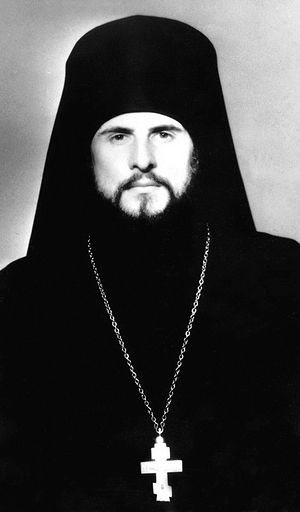
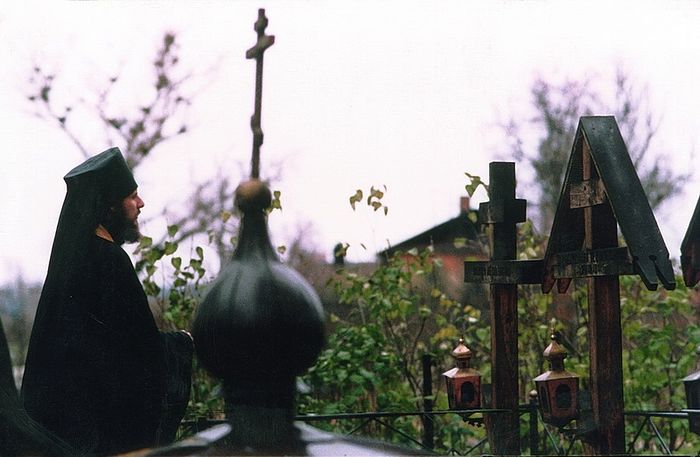
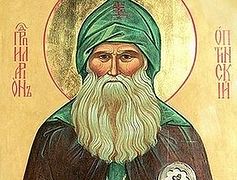
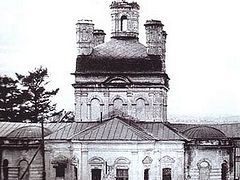
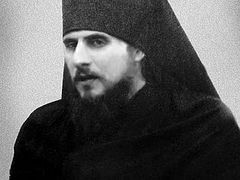
Is this the entire interview? If not, can you get me in contact with the translator so that we can find out if Jesse has translated any more of the interview. Tomorrow we will be showing the interview to our brotherhood, and one of our Russian neighbors is going to attempt to translate it for us. However, if there is already a full transcript of the Russian or a full translation that would be very helpful for us.
Thank you,
Archdeacon Sergius
Hermitage of the Holy Cross
Wayne, WV